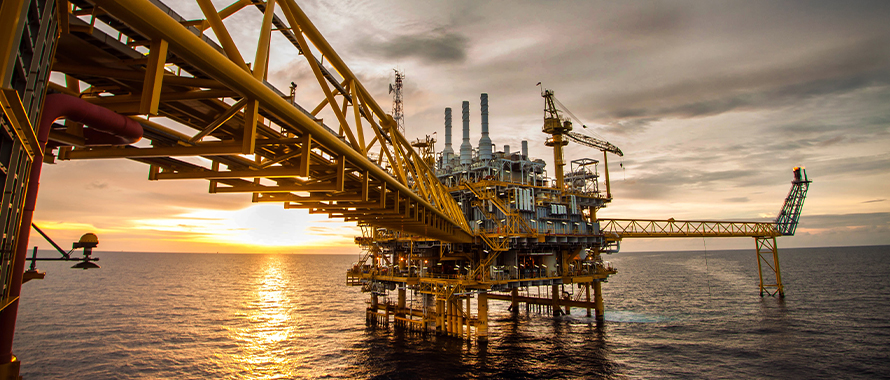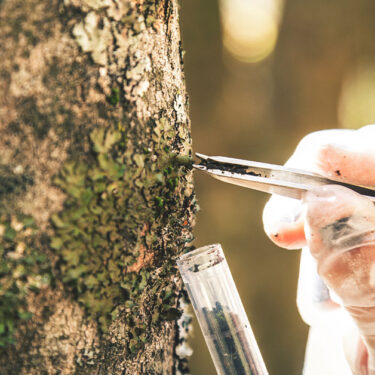Oil and gas production in the Gulf of Mexico was slowed significantly beginning on August 23, as a pair of tropical storms approached U.S. shores and forced the shutdown and evacuation of nearly 300 offshore platforms. Hurricane Laura, one of the most powerful storms to ever hit the U.S., made landfall on August 27, devastating the city of Lake Charles, Louisiana, causing a fire at a chlorine manufacturing plant and claiming several lives.
Damage assessments from the Category 4 hurricane, which brought winds up to 150 mph, are still underway in the oil industry’s refining hub along the Texas and Louisiana coasts. Refineries in the Lake Charles area, including Citgo, were damaged, while those in Houston were spared.
Almost 900,000 homes and businesses were left without power after the storm; nevertheless, according to U.S. Energy Secretary Dan Brouillette, initial assessments indicated damage to oil and gas infrastructure could be minor. Independent Intelligence Commodity Services (ICIS) reported that liquid natural gas shipping would be delayed following the storm.
In anticipation of Hurricane Laura and Tropical Storm Marco, which made landfall on August 25, energy companies temporarily halted 82 percent of oil production and 57 percent of natural gas production in the Gulf. The Texas Commission on Environmental Quality deployed emergency response teams to the area on August 28, and reported that plant shutdowns released 4.35 million pounds of pollutants, including hydrogen sulfide, benzene and nitrogen oxides.
Although oil and gas prices fell following the storm, analysts predict no long-term pricing impacts, due to excess supply from record levels of American oil production and reduced fuel demand during the COVID-19 pandemic. Those same conditions have contributed to multiple bankruptcies and the loss of a combined 118,000 U.S. jobs from fossil fuel industries between March and July. These are historically deep losses for oil companies like Exxon Mobil and Chevron.
“The industry is trying hard to come back,” said Joshua Sizemore, Senior Broker, Environmental, Burns & Wilcox, Denver, Colorado. “There has been a huge glut of oil in the market, which has led to job losses. Much of the recovery is cyclical and energy companies have plans in place, but no one was prepared for a pandemic.”
As the energy industry works to weather its coinciding crises, it also faces the compounding impact of a hardening insurance market affecting rates for essential coverage from Commercial General Liability (CGL) Insurance, Pollution Legal Liability Insurance, Professional Liability Insurance and other types of policies.
“Oil and gas companies as a whole are struggling,” said Cree Teel, Vice President, Senior Broker, Burns & Wilcox Brokerage, North Dallas, Texas. “They are trying to reduce costs while managing premium rate increases.”
Reduced staffing heightens risks
Recent workforce reductions in the U.S. fossil fuel sector include more than 69,400 jobs in oil, 36,400 jobs in gas and 12,100 jobs in coal. While a combined 5,800 jobs were added in July, a decline of nearly 14 percent remains compared to pre-pandemic employment levels. One analysis concluded the pandemic-induced downturn in the oil and gas industry could result in a loss of between 16,058 to 23,122 Canadian jobs directly related to the industry.
With many companies forced to cut staffing to minimum levels, in some cases due to COVID-19 outbreaks on deepwater platforms, errors and other incidents may be more likely to occur.
“Unfortunately, when oil and gas prices are low and work is scarce, companies are more focused on staying in business than on safety and loss controls,” Teel said. “The risk of accidents and errors can increase as a result.”

Unfortunately, when oil and gas prices are low and work is scarce, companies are more focused on staying in business than on safety and loss controls. The risk of accidents and errors can increase as a result.
Sizemore agreed: “There are widespread concerns about the safety of facilities with minimal workforces, especially offshore rigs affected by hurricanes,” he said.
Severe weather is a worsening challenge for energy infrastructure and can result in considerable losses from lost production and storm damage. When Hurricane Harvey hit the Gulf Coast in 2017, more than a dozen oil refineries were impacted by shutdowns, in addition to flooding, physical damage and power outages. Commercial Property Insurance, which could include business interruption coverage, is critical during these times.
“When drilling companies have to remove their operations completely during a storm, that represents millions in losses,” Sizemore said. “The safety of employees is always at the forefront of energy companies’ minds, though—companies want to make sure they are not putting any of their crew in harm’s way.”
Rising cost of pollution, accidents calls for greater protection
Oil spills and other environmental incidents represent a leading source of liability for the energy industry. BP’s massive 2010 Deepwater Horizon oil spill in the Gulf of Mexico has so far cost about $70 billion: $32 billion for clean-up, $20 billion for a global settlement of state and federal civil claims, $7.8 billion for settlements with Gulf Coast residents, $175 million to settle claims with shareholders, and other expenses. Although the Deepwater Horizon spill is an extreme case, the cost of pollution incidents is on the rise, Sizemore said.
“The most important coverage for energy companies right now is Excess Liability Insurance,” he explained. “Due to a plethora of issues, particularly American litigiousness, insurance policies with large limits for liability are essential. A CGL Insurance policy with a $1 million or $2 million limit is wholly inadequate to cover the potential claim damages energy companies face.”
One facility faces third-party lawsuits totaling over $3 million from a March 2019 fire at a petrochemical storage terminal that caused thousands of barrels of oil and chemical products to spill into the Tucker Bayou and Houston Ship Channel, restricting traffic on the channel and prompting a months-long clean-up.
In August 2018, a corroded pipe leaked 24,000 liters of oil—5,000 liters into a Novia Scotia harbor and the rest into a containment trench and cooling water system for Novia Scotia Power. The clean-up and remediation took several months and included replacing approximately 150 meters of a rock wall in front of the power plant. The company did not disclose the cost of the clean-up, as it was not covered by insurance.
All companies involved in the energy industry — from truckers and contractors to storage facilities and pipeline managers — need to be properly insured for pollution events.
“There are business owners out there who may believe they have full pollution coverage for their trucks, but we have seen many claims where pollution is not being paid out for incidents involving trucks because the company’s CGL Insurance policy excludes pollution,” Sizemore noted. “This is why Pollution Legal Liability Insurance is so important.”
Mistakes made by workers may fall under a company’s Errors & Omissions (E&O) Insurance policy, Teel said. He recalled an incident in which an entire pipeline had to be unearthed—at a cost of $7 million—after an audit revealed a problem with the images a worker captured while scanning the pipeline for leaks before it was placed underground.
Companies need to be prepared, even for so-called “once-in-a-lifetime” incidents. “Many smaller companies buy only the minimum required insurance,” Teel said. “If they experience a costly event and they do not have insurance coverage to help mitigate their losses, that one event could put them out of business.”

Many smaller companies buy only the minimum required insurance. If they experience a costly event and they do not have insurance coverage to help mitigate their losses, that one event could put them out of business.
Companies should alert their insurance providers as soon as possible after an event occurs, Sizemore added. “Their insurance provider will have access to professionals who can walk them through the entire claims process.”
Consult experts to navigate evolving industry
Oil and gas company bankruptcies in North America have surged during the pandemic; as of July 9, 23 oil producers and 18 oilfield service firms had filed for bankruptcy protection. One analysis indicated that reduced production and investment in oil and gas could shrink Canada’s GDP by as much 1 to 2 percent.
As more energy companies cope with the economic fallout from COVID-19, some have chosen to scale back or cancel insurance policies. It should be noted that even a company that has closed may incur costs related to work done prior to its closure, and business leaders should discuss this possibility with their insurance brokers.
“We are seeing a number of companies cancel their insurance policies, planning to purchase new coverage when the demand for their services returns,” Teel explained. “There are better alternatives. Some carriers allow insured companies to amend their policies mid-term. Even though Excess Liability Insurance rates are increasing, a creative, knowledgeable insurance broker can offer cost-saving options like a project-specific policy, if needed.”
Close communication with an experienced broker can help companies find the right solution. “We provide solutions for companies in the energy industry on a daily basis,” Sizemore said. “Especially in this hard market, it is critical for energy companies to work with a broker who has access to markets and products that address their specific exposures.”
Renewable energy is also transforming the oil and gas industry. On August 4, BP Oil announced it would cut its oil and gas production by 40 percent by 2030 and invest billions more in green energy as it works to achieve net zero emissions by 2050. Renewable energy is expected to be the only energy source with demand growth for the remainder of 2020 and could help drive economic recovery in Canada and the U.S.
In the wake of COVID-19, energy companies are reconfiguring and reassessing their approach to remaining competitive in the rapidly shifting global market.
“We are seeing across-the-board industry changes that are prompting companies to transform their business plans,” Sizemore said. “The oil and gas industry could look very different after the pandemic.”









